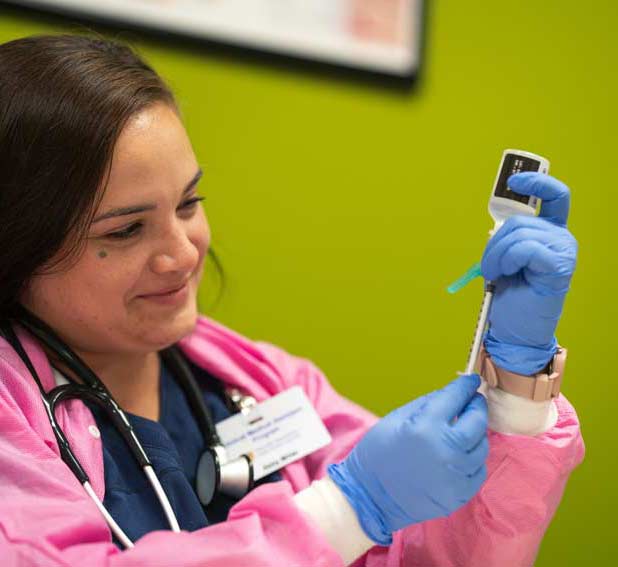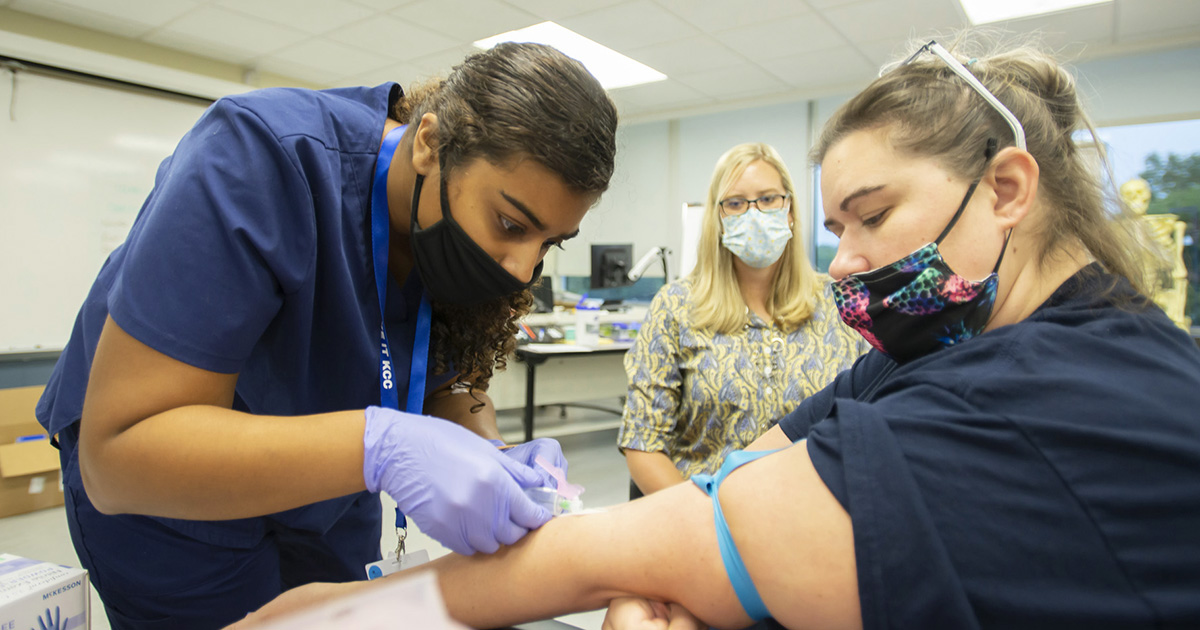Fast-Track or Full-Length? Everything About Completing a Phlebotomy Training Course
Fast-Track or Full-Length? Everything About Completing a Phlebotomy Training Course
Blog Article
The Course to Accreditation: Recognizing the Phlebotomy Educating Training Course Trip and Its Importance
As you consider the course to qualification in phlebotomy, it's important to comprehend the role you'll play in health care. Your training will cover crucial skills, from blood collection techniques to patient communication.

The Function of Phlebotomists in Health Care
Phlebotomists play a vital duty in the healthcare system, functioning as the crucial link between clients and crucial diagnostic screening. You'll do blood draws, making certain examples are gathered accurately and securely. Your know-how aids in diagnosing medical problems, monitoring wellness, and directing therapy decisions.
In your day-to-day interactions, you'll require to develop trust fund with patients, making them feel comfortable throughout what could be a demanding experience. You are accountable for classifying and taking care of samples meticulously to stop contamination or mistakes, which might influence test results.
Yet, you'll typically work together with doctors and registered nurses, interacting important details concerning patients' problems. Your function is basic in keeping the workflow in healthcare settings, guaranteeing timely and exact results. By mastering your abilities, you contribute meaningfully to individual care, making you an important part of the medical team. Accepting this duty is key to your success as a phlebotomist.
Review of Phlebotomy Training Programs
When exploring phlebotomy training programs, you'll locate various kinds created to fit different routines and learning styles. Each program helps you establish necessary abilities like blood collection and client interaction. Comprehending these options is essential to picking the right path for your occupation.
Sorts Of Educating Programs
Several sorts of training programs are available for those seeking to come to be competent in phlebotomy. You can select from certificate programs, which typically last a few months and concentrate on important skills. There are likewise diploma programs that offer an even more complete education, typically lasting as much as a year. If you're trying to find a much deeper understanding, an associate level in an associated area may be the appropriate fit. On the internet programs use flexibility for those balancing job or household commitments, permitting you to examine at your own pace. Furthermore, some health centers and centers supply on-the-job training programs, supplying sensible experience while you discover. Whatever course you choose, each program aims to equip you with the essential abilities for a successful phlebotomy profession.

Trick Skills Established
Grasping phlebotomy calls for a set of key skills that are established through complete training programs. You'll find out technological abilities like correct vein selection, needle insertion, and blood collection techniques. These hands-on methods assure you can carry out procedures securely and successfully. In addition, interaction abilities are essential; you'll need to interact with patients, describe procedures, and placed them comfortable. Understanding anatomy and physiology is important, as well, as it helps you situate capillaries and recognize the body's response to blood attracts. You'll obtain expertise of safety and security methods and infection control, assuring you maintain a sterile setting. Each of these skills is essential for your success as a certified phlebotomist, making you a valuable asset in any type of medical care setup.
Secret Parts of a Phlebotomy Training Course
In a phlebotomy program, you'll concentrate on necessary topics that lay the groundwork for your future career. You'll participate in hands-on training that permits you to use what you've found out in real-world setups. Both the curriculum and functional experience are essential for your success as a phlebotomist.
Curriculum Summary
While seeking a phlebotomy training program, you'll encounter a core curriculum developed to equip you with fundamental skills and understanding. Phlebotomy Classes Near Me. This curriculum normally includes composition and physiology, concentrating on the blood circulation system and recognizing blood components. You'll also discover various kinds of blood collection methods, including venipuncture and capillary puncture strategies
Furthermore, infection control and safety procedures are essential components, ensuring you recognize exactly how to keep a clean and sterile environment. You'll study patient interaction, stressing interaction and compassion, which are vital for alleviating individual anxiety. Lastly, ethical and legal considerations will certainly be resolved, preparing you for real-world responsibilities. This fundamental understanding will certainly enable you to succeed as a phlebotomist and provide quality care in medical settings.
Hands-On Training Experience
Obtaining hands-on experience is a crucial part of your phlebotomy training course. This sensible training enables you to use what you have actually learned in a real-world setup, boosting your abilities and self-confidence. You'll practice venipuncture strategies, learn just how to manage different sorts of specimens, and get accustomed to the devices made use of in the area. Under the support of experienced instructors, you'll refine your skills, guaranteeing you're planned for any circumstance you may encounter.
Additionally, you'll obtain the chance to connect with patients, which is necessary for creating your communication skills. This combination of technological proficiency and social skills is critical for your success as a licensed phlebotomist. Inevitably, hands-on training is where theory fulfills practice, strengthening your understanding and preparedness for certification.
Certification and Licensing Demands
Prior to you can start your profession in phlebotomy, it is essential to understand the certification and licensing needs that vary by state. A lot of states need phlebotomists to hold a qualification from an acknowledged company, such as the National Phlebotomy Organization or the American Society for Medical Pathology. These qualifications commonly include passing an exam that checks your understanding and skills in the field.
Along with qualification, some states have details licensing demands. You may require to finish a particular variety of hours in medical practice, send evidence of training, or undergo a background check. It is very important to investigate your state's guidelines to make certain you meet all necessary requirements.
Staying informed regarding these demands not just assists you safeguard a position but additionally boosts your reputation as a specialist. By meeting these needs, you'll be well on your way to an effective occupation in phlebotomy.
Hands-On Training and Practical Experience
Hands-on training and practical experience are necessary components of your phlebotomy education, as they permit you to apply academic expertise in real-world situations. During your training, you'll participate in supervised venipuncture, learn appropriate strategies, and come to be aware of different blood collection tools. This direct involvement is crucial for constructing your self-confidence and developing your abilities.
You'll function carefully with experienced professionals who can guide you through the subtleties of person interaction and sample handling. Each practice not only reinforces your understanding yet additionally prepares you for the hectic setting of healthcare settings.
In addition, numerous programs integrate clinical turnings, allowing you to experience diverse setups, from healthcare facilities to outpatient centers. This exposure helps you adjust to various obstacles and patient demands, guaranteeing you're well-prepared for your future duty. Embrace these opportunities, as they're important to becoming a skilled and compassionate phlebotomist.
Difficulties Encountered During Training
While obtaining hands-on experience is crucial, it is necessary to identify the obstacles that can emerge throughout your phlebotomy training. You could come across anxiousness when performing treatments on genuine people, particularly if you're brand-new to the environment. The pressure to obtain every little thing right can be overwhelming. In addition, grasping the skills required for blood attracts takes practice; you might deal with method initially.
Time administration can likewise be a hurdle, as harmonizing theory, practical sessions, and personal commitments can feel daunting. You might face differing learning rates among your peers, causing sensations of insecurity if you assume you're falling back. Lastly, adjusting to the various individualities of teachers can be difficult, as each may have an one-of-a-kind mentor style.
Recognizing these barriers early can prepare you for success and aid you create durability throughout your training journey.
Occupation Opportunities After Qualification

As you gain experience, you may even consider concentrating on locations like pediatric or geriatric phlebotomy, satisfying details person demands. Some phlebotomists choose to progress their careers by ending up being research laboratory service technicians or seeking additional education in health care fields.
In addition, your certification can lead to roles in training or monitoring brand-new phlebotomists, enabling you to share your understanding. With the health care sector continuously growing, your skills will certainly always be in need, paving the means for a secure and meeting occupation. Accept the chances awaiting you!
Often Asked Concerns
What Is the Common Period of a Phlebotomy Educating Training Course?
Phlebotomy training programs commonly last around four to 8 weeks. You'll participate in hands-on method, classroom direction, and online discovering. Completing this training prepares you for accreditation and a fulfilling profession in healthcare.
Are Online Phlebotomy Courses Available?
Yes, on the internet phlebotomy courses are readily available. They offer versatility and convenience, permitting you to study at your own rate. Just validate the program is accredited to fulfill certification requirements and get valuable abilities for your profession.
Just How Much Does Phlebotomy Training Generally Expense?
Phlebotomy training usually sets you back in between $700 and $2,500, depending upon the program and place. You should consider elements like training course length, included materials, and hands-on experience when selecting the appropriate training for you.
What Are Usual Prerequisites for Phlebotomy Training?
Typical requirements for phlebotomy training usually include a senior high school diploma or GED, immunizations, and a background check. Some programs might also require standard health care understanding or accreditations, ensuring you're planned for hands-on training.
Can I Work While Completing My Phlebotomy Training?
Yes, you can Phlebotomy school work while finishing your phlebotomy training. Many pupils balance jobs with their researches, however ensure to manage your time properly to assure you satisfy both job and training dedications effectively.
Report this page